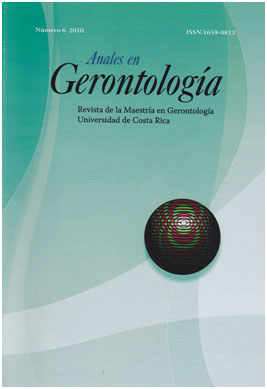Abstract
Costa Rica ́s process of population aging is a consequences of a low fertility and high life expectancy which outlines new challenges in the attention for chronic diseases. A sample of elderly people is analyzed at the urban periphery with three objectives: to study the validity of the individual report of medication for chronic illnesses (diabetes, hypertension and cardiac disease) in relation to an objective revision of the first-aid kit of the participants, to determine the effect of sociodemographic factors in the probability of a appropriate medication regimen and to elucidate the multidimensional process of medication holding. A weak relationship is evidenced between the report of medication and the first-aid kit revision, some factors influence positively the possibility of having appropriate medication like literacy, company and an increase Yesavage ́s scale score; others influence it negatively as alcoholism and co morbidity. There was evidence for just one dimension in the process to medications according to the variables used in this sample.References
Altman, D. (1991). Practical Statistics for Medical Research. Estados Unidos: Chapman-Hall.
Balakrishnan, R. (1998). Predictors of medication adherence in the elderly. Clinical Therapeutics. 20(4), 764-71.
Barat, I.; Andreasen, F. & Damsgaard, E. M. (2001). Drug therapy in the elderly: what doctors believe a patients actually do. British Journal of Clinical Pharmacology. 51(6), 615-622.
Becker, M. H. (1974). The health belief model and personal health behaviour. 2ed. Health Education Monograph. 336-353.
Botelho, R. J. & Dudrak, R. (1992). Home assessment of adherence to long-term medication in the elderly”. Journal of Family Practice. 35(1), 61-5.
Cáceres, R. (2004). Estado de salud, físico y mental de los adultos mayores del área rural de Costa Rica, 2000. Población y Salud en Mesoamérica. 1(2). Revista electrónica. Recuperado de: http://ccp.ucr.ac.cr/revista/
Centro Centroamericano de Población. (2005). Costa Rica: estudio de longevidad y envejecimiento saludable (CRELES). Accesado el 28 de febrero 2005. Recuperado de: http://www.ccp.ucr.ac.cr/creles/
Cohen, J. (1960). A coefficient of agreement for nominal scales. Educational and Psychological Measurement. 37-46.
Coons, S. J. and et al. (1994). “Predictors of medication noncompliance in a sample of older adults”. Clinical Therapeutics. 16. Pp.110-117.
DiMatteo, R. and et al. (2002). Patient Adherente and Medical Treatment Outcomes: A Meta-Analisys. Medical Care. 40(9), 794-811.
Dirección General de Estadística y Censos. (1998). Encuesta de hogares de propósitos múltiples 1997. San José, Costa Rica.
El Emam K. Benchmarking Kappa for Software Process Assessment Reliability Studies. (1999). Empirical Software Engineering: An International Journal. 4(4), 113-133. ISSN: 1382-3256.
Green, L. W. (1980). Health Education Planning: A diagnostic approach. Mayfield, Palo Alto.
Hosmer, D. and Lemeshow, S. (2000). Applied Logistic Regression. 2ed. Estados Unidos: Editorial Wiley-Interscience. 116-128.
Hussey, L. (1991). Overcoming the clinical barriers of low literacy and medication noncompliance among elderly. Journal of Gerontological Nursing. 17(3), 27-29.
Marcoulides, George and Hershberger, Scott. (1997). Multivariate statistical methods. A first course. New Jersey: Lawrence Erlbaum Associates. ISBN: 0-8058-2571-1 (c).
Morales-Martínez, Fernando. (2000). Temas prácticos en Geriatría y Gerontología. San José, Costa Rica: Editorial Universidad Estatal a Distancia.
Organización Panamericana de la Salud. (2004). La salud de las personas adultas mayores en Costa Rica. San José, Costa Rica: Organización Panamericana de la Salud.
Robertson, M. H. B. (1992). The meaning of compliance: patient perspectives. Quality Health Review. 2(1), 7-26.
Simpson, C. and et al. (2004). Agreement Between Self-Report of Disease Diagnoses and Medical Recor Validation in Disabled Older Women: Factors that Modify Agreement. Journal of American Geriatrics Society. 52, 123-127.
Sullivan, S. D., Kreling, D. H. & Hazlet, T. K. (1990). Noncompliance with medication regimens and subsequent hospitalizations: a literature analisys and cost of hospitalization estimate. Journal of Research Pharmaceutical Economic. 2, 19-33.
Uebersax, J. Kappa Coefficients [Web Page]. Accessed 16 de mayo de 2004. Available at: http://ourworld.compuserve.com//homepages/jsuebersax/agree.html
Notes: http://ourworld.compuserve.com//homepages/jsuebersax/agree.html
Vergara, F. et al. (1994). Influencia del círculo de abuelos sobre la salud. Estudio comparativo entre un grupo de integrantes y un grupo control. Revista Cubana de Medicina General Integral. 10(4), 321-5.
Vik, S. A.; Maxwell, C. J. & Hogan, D. B. (2004). Measurement, correlates, and health outcomes of medication adherence among seniors. The Annals of Pharmacotherapy. 38(2), 303-12.
Weiner M. et al. (2003). Predictors of Health Resource Use by Disabled Older Female Medicare Beneficiaries Living in the Community. Journal of American Geriatrics Society. 51, 371-379.

